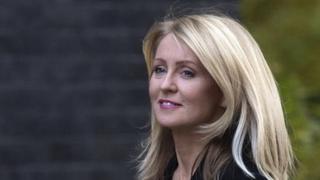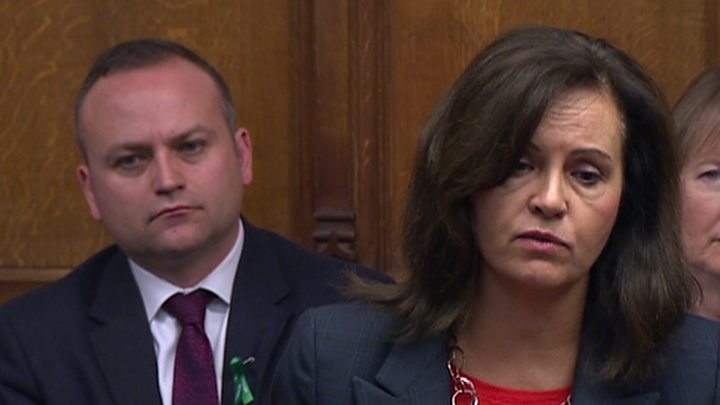Esther McVey: Some to be poorer under universal credit
 Image copyright
EPA
Image copyright
EPA
Some people will be worse off under universal credit - but they can take on more work to increase their income, the minster in charge says.
Work and Pensions Secretary Esther McVey defended the new benefit system amid reports 3.2 million households will lose more than £2,000 year.
She told the BBC some people would lose out because the government had made "tough" spending decisions in 2015.
But she insisted the most vulnerable would be protected.
Speaking at Prime Minister's Questions on Wednesday, Theresa May said "people who are moved on to universal credit... will not see any reduction" in their benefits.
Ms McVey is reported to have privately told cabinet colleagues that many claimants could lose as much as £200 a month as a result of the switch to universal credit, which replaces a range of existing benefits.
Asked about those reports, she told BBC News: "Some people could be worse off on this benefit. But a thousand people every day since 2010 have gone in to work."
Asked about those who would lose out, she said: "If those people can work, what they will be losing is benefits, but what they have got now is work. Work will be paying. Their wage will be increasing."

Ms McVey also hit back at criticism from Sir John Major who has warned that universal credit could hurt current prime minister Theresa May in the same way poll tax hurt the then prime minister Margaret Thatcher in 1989 and 1990.
She said she "knows more about universal credit" than the former Conservative prime minister.
But the government is facing growing calls from Conservative MPs - including the architect of the system Iain Duncan Smith and other backbenchers facing complaints from constituents - to scrap a promised income tax cut and instead pump more more money into universal credit.
Universal credit is a new benefit for working-age people that consolidates into one monthly payment six separate benefits:
- income support
- income-based jobseeker's allowance
- income-related employment and support allowance
- housing benefit
- child tax credit
- working tax credit
Read more: What is universal credit?
Currently being phased in for different types of claimant across the UK, universal credit is aimed at making the benefits system simpler and more flexible so people who are able to work are rewarded for doing so.
Universal credit has been criticised for running over budget and causing delays to people's payments, but the plan is to move all existing benefit claimants on to it next year.
Ms McVey claimed it was working "much better than the old system" which "kept people out of work" and she said the government was putting £3.1bn into helping people affected by the transition to the new system.
But the Resolution Foundation think tank said less than 20% of affected families are expected to receive support from the government to change to the new system.
People whose circumstances change, who make a brand new claim, or who come off benefits and then go back on them, will not be protected.
Labour leader Jeremy Corbyn said the universal credit system "has to change very very rapidly" and that Labour will be proposing "a more comprehensive system" in which nobody would be "worse off".
Speaking in Bristol, Mr Corbyn said that Labour would "immediately stop the process" of the nationwide rollout and would maintain "existing levels of benefit immediately".
"We will be proposing a more comprehensive system but essentially our benchmarks have been nobody should be worse off and nobody should have their homes put at risk because of universal credit."
The switch to universal credit will create some winners, the Resolution Foundation says, with 1.1 million households an average of £53 a week better off.
But, overall, working families will be worse off than under the current benefit system, with the biggest losers likely to be people with children who are currently in receipt of tax credits, analysts say.
What are your experiences of Universal Credit? Share your thoughts by emailing haveyoursay@bbc.co.uk
Please include a contact number if you are willing to speak to a BBC journalist. You can also contact us in the following ways: